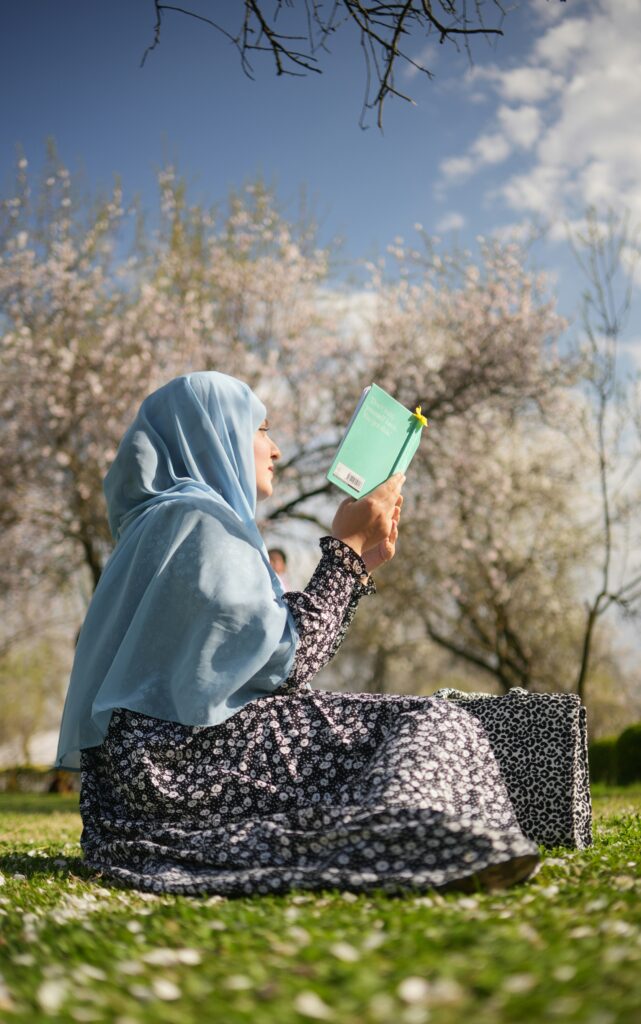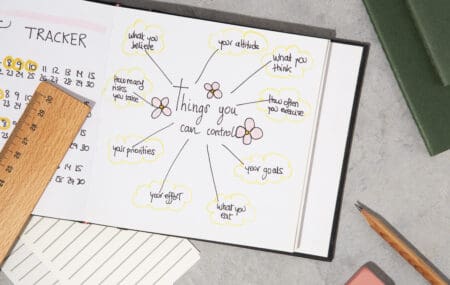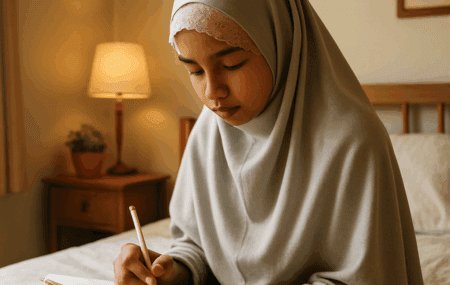
Culture vs Islam: Debunking a Series of Myths
Menstruation is a natural fact and divinely ordained process. But it is often surrounded by myths and misconceptions that can lead to feelings of shame, isolation, and even self-doubt. For many women, this can perpetuate stigma and prevent open conversations and access to proper healthcare and understanding.
The religion of Islam, in its infinite perfection, offers a kind, balanced, and dignified perspective on menstruation. The Qur’ān and the teachings of Prophet Muhammad ﷺ treat menstruation as a normal part of life. It removes any sense of taboo, promoting kindness, and an enduring connection between a woman and Allah during this time.
This piece hopes to gently challenge common myths about menstruation. The aim is to foster a more inclusive and understanding environment where every Muslim woman feels supported and valued.
Myth #1: Menstruating women are impure and should avoid all religious activities
Reality: Menstruation is a biological fact decreed by Allah, not a sign of impurity or shame. Women on their period are not considered “dirty” or excluded from Allah’s mercy.
In Islamic law, menstruating women are in a state of janābah (ritual impurity). But this state simply limits specific acts like ṣalāh (prayer) and ṣawm (fasting), and sexual intimacy. These restrictions are a form of Divine Mercy, intended to provide rest and ease during a time of physical and emotional changes. They do not signify Allah’s ﷻ displeasure. In fact, following these guidelines is considered an act of worship and obedience to Allah ﷻ.
During menstruation, women are encouraged to explore other ways to strengthen their spirituality and still earn immense rewards:
- Listen to and reflect on the Qur’ān
- Engage in dhikr (remembrance of Allah) and duʿāʾ (supplication)
- Send ṣalawāt (blessings) upon the Prophet ﷺ
- Spend quality time with loved ones
- Seek knowledge and deepen understanding of faith
- Give in charity or serve others
- Rest and take care of their physical health
The Prophet Muhammad ﷺ once comforted ʿĀʾisha (raḍiy Allāhu ʿanhā) when she started her period during Ḥajj season, saying: “This is a matter that Allah has decreed for the daughters of Ādam” (Bukhārī 294). This gentle reminder tells us that menstruation is neither a flaw nor a punishment. Whether fasting and praying when He commands, or refraining when He prohibits, both acts are done out of loving obedience to our Merciful Lord. The menstrual phase gently invites us to draw closer to Allah, both during these times and beyond.
Myth #2: Menstruating women can’t shower or bathe
Reality: Some cultural myths discourage women from bathing during their periods, citing health concerns or the spread of “impurity.” These misconceptions have no basis in Islam, which places cleanliness and self-care at the heart of faith.
The Prophet Muhammad ﷺ taught us: “Cleanliness is half of faith” (Muslim 223).
Bathing during menstruation is not only permissible but beneficial. It helps women feel refreshed and reduces discomfort associated with menstruation. Regular showers can prevent infections, manage odours, and minimise irritation, all while promoting overall well-being.
Here are some tips for maintaining intimate hygiene during menstruation:
- Change menstrual products regularly to avoid irritation and infections.
- Use breathable underwear to promote air circulation.
- Stay hydrated throughout the day, which supports your body’s natural processes.
- Keep the genital area clean and dry by using unscented, mild soap.
- Avoid scented products that can alter your vaginal pH balance, increasing the risk of infections.
- Remove pubic hair regularly, as recommended in Islam (every 40 days), to maintain cleanliness.
- Wipe from front to back after using the toilet to avoid contamination.
- Use warm water, not hot, when cleaning intimate areas to prevent dryness or irritation.
Through maintaining hygiene during menstruation, women can also practice self-care and embody gratitude for their body.
Myth #3: Women shouldn’t talk about periods
Reality: Unfortunately, in many cultures, menstruation is still considered a topic of shame and embarrassment. This leads to a lack of education, and a culture of silence where women feel uncomfortable learning about their health.
Islam normalises open, respectful discussions for the purposes of learning. Indeed, ʿĀʾishah (ra) praised the women of the Anṣār, saying: “How good are the women of the Anṣār! Shyness did not prevent them from seeking knowledge of their dīn” [Muslim 332c]. The Prophet ﷺ also encouraged his companions to ask questions about anything concerning them and the dīn. Jābir (ra) narrated that the Prophet ﷺ said: “The cure of ignorance is asking” [Abi Dawūd 336]. Allah ﷻ also says in the Qurʾān: “Ask the people of remembrance if you do not know” [16:43].
The ḥadīth collections record many questions asked by women. At times, women hesitated to ask personal questions in the presence of men. To address this, the Prophet ﷺ set aside a special day just for women, where they could ask him anything they wished. This gave them the dedicated space they needed to learn about the dīn. Here are some examples of the kinds of questions asked.
Fāṭimah bint Abī Ḥubaysh once asked the Prophet ﷺ: “O Allah’s Apostle! I do not become clean (from bleeding). Shall I give up my prayers?” The Prophet ﷺ explained the difference between menstrual and irregular bleeding. “No, because it is from a blood vessel and not the menses. So when the real menses begins give up your prayers and when it (the period) has finished wash the blood off your body (take a bath) and offer your prayers” [Bukhari 303].
Asmāʾ (daughter of Shakal) asked the Messenger of Allah ﷺ about washing after menstruation. He said: “Everyone amongst you should use water (mixed with the leaves of) the lote tree and cleanse herself well, and then pour water on her head and rub it vigorously till it reaches the roots of the hair. Then she should pour water on it. Afterwards, she should take a piece of cotton smeared with musk and cleanse herself with it.” Asmāʾ said: “How should she cleanse herself with the help of that?” Upon this, he ﷺ replied, “Praise be to Allah, she should cleanse herself!” ʿĀʾishah (ra) said in a subdued tone that she should apply it to the trace of blood. Following this, Asmāʾ further asked about bathing after sexual intercourse. The Prophet ﷺ responded with detailed guidance [Muslim 332c].
How to break the stigma around menstruation:
- Teach children early so they feel ready and informed, helping her remove any fear or stigma.
- Gracefully introduce the correct Islamic perspective. Sharing stories of the Prophet Muhammad ﷺ and his companions, can help show how menstruation was treated with dignity and respect.
- Create an open door policy. Talk openly with friends and family to normalise the conversation. Answer questions about physical changes, emotions, and common misconceptions.
- Respect conversational boundaries, privacy and comfort while still encouraging education.
- Involve men (particularly fathers, husbands and brothers) in discussions to create a more inclusive and supportive environment.
- Treat periods as a normal part of life at home, school, and the workplace.
- Organise workshops in communities and schools to educate about menstrual health and hygiene.
- Participate in community initiatives that provide sanitary products to those in need globally. Helping one see menstruation in a broader context can give one a sense of purpose and connection.
Breaking the silence around menstruation is a step toward compassion, understanding, and collective growth.
Myth #4: Menstruating women should be isolated from everyone
Reality: In some cultures, women are isolated or kept separate during their periods, whether by being forced to sleep in a different bed or eat with separate dishes. These practices also have no basis in Islam. The Prophet ﷺ did not distance himself from his wives during their menses; instead, he showed them love and affection. For example, the Prophet ﷺ once asked ʿĀʾisha (ra) to comb his hair while she was menstruating. Her natural cycle did not make her “untouchable”. “ʿĀʾisha (ra) used to comb the Prophet’s hair while she was menstruating” (Bukhārī 295). He ﷺ would also drink from the same spot on a cup as her during her period and even rest his head on her lap while reciting the Qur’ān (Sunan an-Nasāʾī 70).
As for Islamic guidelines such as abstaining from sexual intimacy during menstruation, (Sūrah al-Baqarah 222), scholars have reflected on this verse. Imām al-Qurṭubī’s interpretation highlights the wisdom behind it. He explained that the Qur’ānic instruction strikes a balance between two extremes — prohibiting intimate relations during menstruation while still encouraging emotional closeness and interaction between spouses. From a health perspective, avoiding sexual intercourse during menstruation can reduce the risk of various physical complications, including urinary tract infections (UTIs), bacterial and fungal infections, endometriosis flare-ups, and increased vaginal sensitivity due to the disruption of the body’s natural cleansing process.
In short, the prohibition is intended to honour and protect women while fostering mutual respect and care within a relationship. This guidance is not about labelling women as impure. Rather, it recognises physical, emotional, and spiritual well-being during this sensitive time. The Prophet ﷺ exemplified this beautifully. He would ask his wives to wear a waist-wrapper (izār) while they were menstruating, and he would still embrace them with love and care. His actions remind us that affection, compassion, and respect transcend physical restrictions, highlighting the emotional and spiritual intimacy that remains central to a loving relationship.
Myth #5: Menstrual products affect a woman’s virginity
Reality: Virginity is linked to the act of sexual intercourse, not the state of the hymen. The hymen is a thin tissue at the opening of the vagina, and it can stretch or be torn in many ways unrelated to sex, such as:
- Physical activity, like sports
- Accidents
- Bicycle riding
- Using menstrual products, such as tampons
Choosing the right menstrual product — whether pads, tampons, menstrual cups, or other options — is a personal decision. It has no bearing on a woman’s chastity or purity. Therefore, it’s super important to choose products that ensure comfort and hygiene.
Regarding the permissibility of certain menstrual products, there may be differences of opinion among scholars. Seek guidance from local Islamic scholars to make an informed decision based on their personal circumstances and needs.
Final thoughts
Menstruation is a natural part of Allah’s ﷻ divine creation. It is neither shameful nor a weakness. Instead, it reflects strength, resilience, and mercy in nurturing life. The Prophetic example teaches us to approach menstruation with compassion, understanding, and knowledge. It is a sacred part of a woman’s life journey, deserving of dignity, respect, and thoughtful care. Through awareness and empathy, we can honor this process while encouraging a healthier, more supportive community for all.

